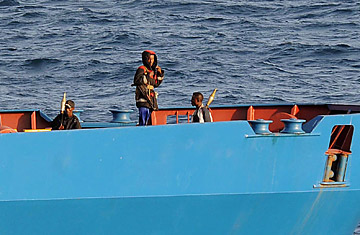
Somali pirates holding the merchant vessel, MV Faina, stand on the deck of the ship.
France notched an important victory against the pirates who plague commercial shipping off the Horn of Africa, when it arrested nine of them at sea during a raid near the Gulf of Aden. But the roots of Somalia's piracy problem lie in the breakdown of state authority on land, which is why many questioned just how effective the French Naval action — or the NATO patrols due to begin in the coming days — will be in curbing the pirates. The nine nabbed by the French, after all, were stripped of their weapons and then handed over to the very Somali authorities who have failed to keep them under control in the first place.
"After obtaining assurances from the local officials in Somalia that they'd be put on trial and that their human rights would be respected, we delivered them to the custody of local authorities," said French Defense Ministry spokesman General Christian Baptiste. "This operation is sending a message to pirates in the region that continuing their activity will be getting more dangerous and expensive for them."
Perhaps, but only if the authorities in the self-declared autonomous region of Puntland keep their end of the deal. And a look at the track record on controlling piracy of the authorities in Puntland and elsewhere in Somalia does little to inspire confidence. The pirates operate their increasingly lucrative industry with impunity from a number of fishing villages along the Puntland coast, where they currently hold at least 12 vessels, and more than 200 of their crew members, awaiting ransom payments. The best known of these is the Ukrainian freighter MV Faina, and its cargo of tanks and other weapons, hijacked almost a month ago, although some 73 vessels have been captured this year netting the pirates as much as $30 million in ransom payments.
Somalia has been a failed state since its degeneration into clan warfare in the 1990s following the death of the dictator of General Mohammed Siad Barre. Today, it is ruled by a fragile coalition of warlords kept in place by the Ethiopian army, which invaded with U.S. backing to drove out an Islamist authority that had, ironically, managed to tamp down piracy, but was also harboring wanted al-Qaeda figures. And some of the warlords in the current government are accused by international observers of being the real commanders of Puntland's half-dozen main pirate groups.
"Most of [the pirates] are linked to warlords," Andrew Mwangura, head of the Kenya-based Seafarers' Assistance Program, told reporters last April. "And the warlords are linked to the [government], all the way to the top."
It may seem perplexing, then, that when France nabbed the nine men scouting a passing ship 100 miles off Somalia's coast and found their boat laden with assault rifles, grenade launchers, and grappling hooks, they simply confiscated the boats and gear, and handed the men over to the authorities on shore. The estimated $30 million in ransom payments that has flowed into pirate coffers in the area over the past year will easily pay for replacement equipment, and even in the remarkable event that the nine remain behind bars, there's no shortage of recruits to one of Somalia's few booming industries.
France has made battling the Somali pirates a major priority of its forces in the region. (France maintains a permanent military base in nearby Djibouti.) The French and NATO vessels will patrol the waters off Somalia under a U.N. mandate to escort commercial ships and those carrying humanitarian supplies to drought-stricken areas, and to scour the area for pirates before they strike. Last April, French forces had stormed the luxury cruiser Le Ponant to rescue 30 vacationers and crew members taken hostage by Somali pirates. Six of those pirates, plus six others captured after another French hostage intervention, now await trial in Paris.
The difference between the captives taken for trial in Paris and those handed over in Puntland, says Baptiste, is that French law allow those who have attacked French citizens to be tried, whereas its jurisdiction would not easily stretch to pirates waiting to strike in far-off international waters. And while Baptiste does not say as much, there's reason to believe that the French may have learned enough in the course of interrogating the nine to make it politically dangerous for their warlord masters to set them free. "We know who the pirates are, where they come from, what clan they're with — we know quite a bit," Baptiste says. "If it's learned they've somehow vanished into air, we'd also have good reasons for speculating why that happened."
The French are hoping that if the nine are tried and jailed by the Somali authorities, the piracy industry could begin to unravel. Right now, though, the pirates of Puntland don't seem to be feeling any need to panic.
